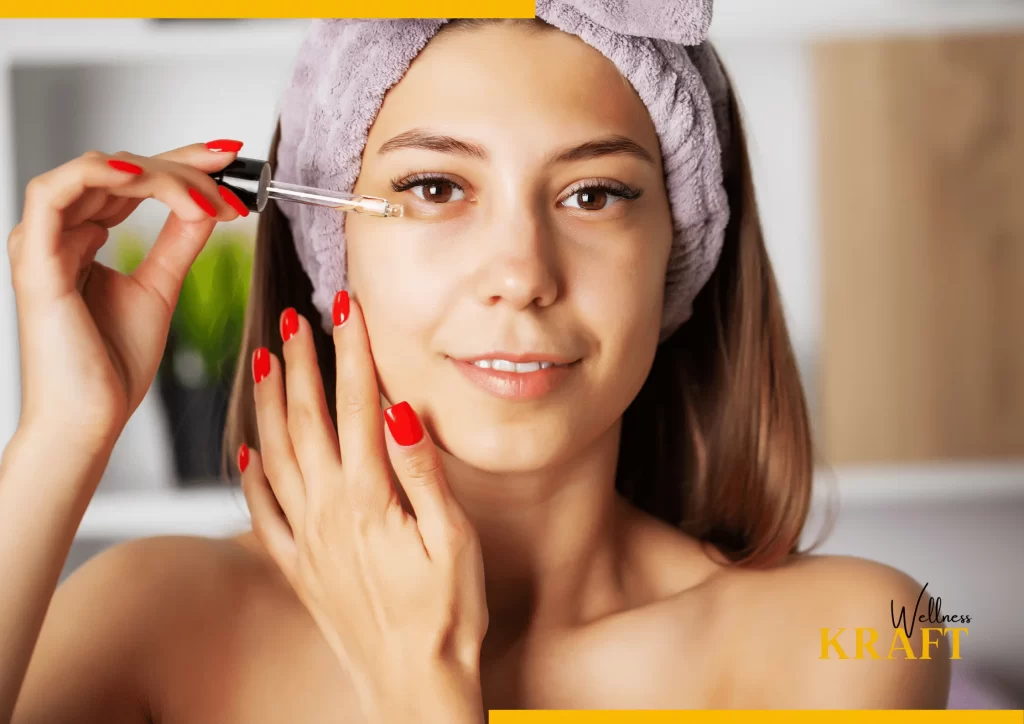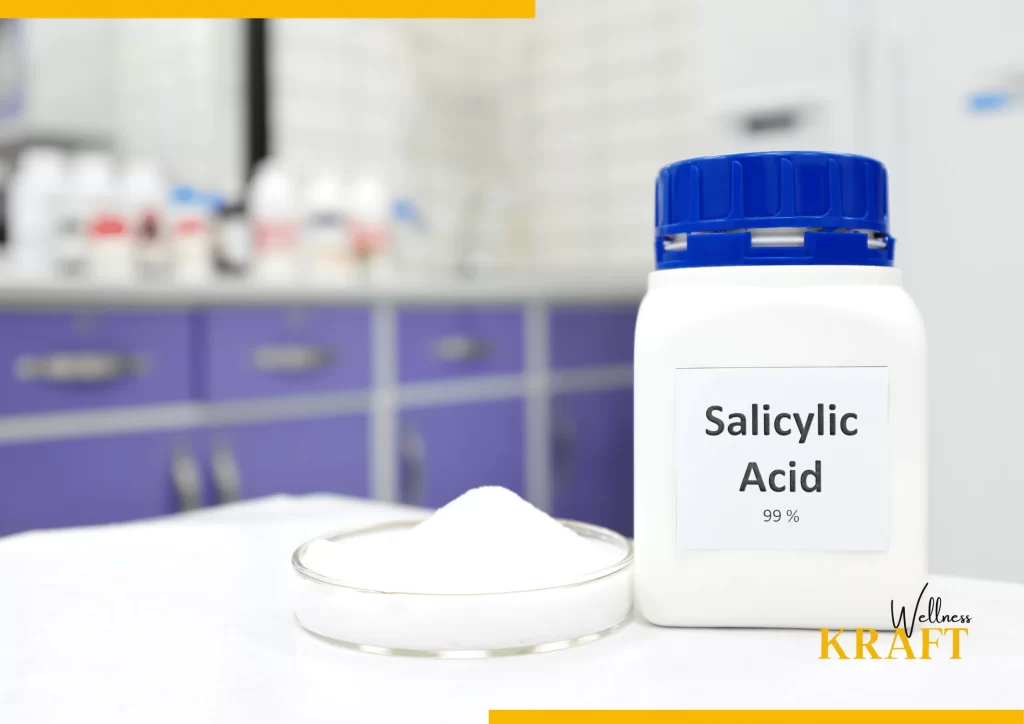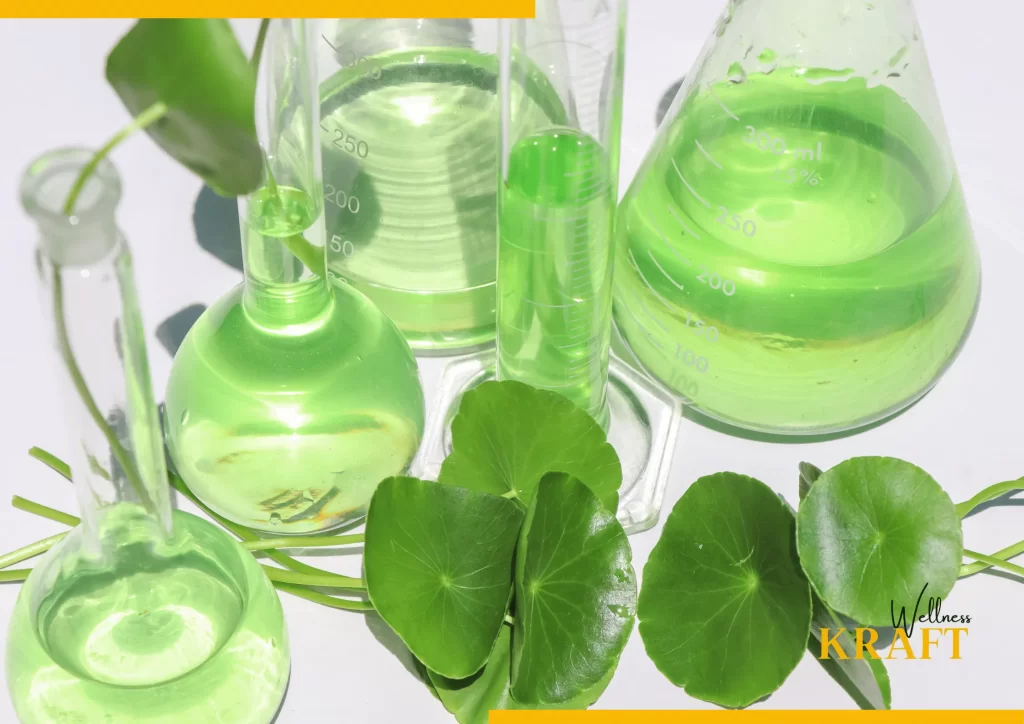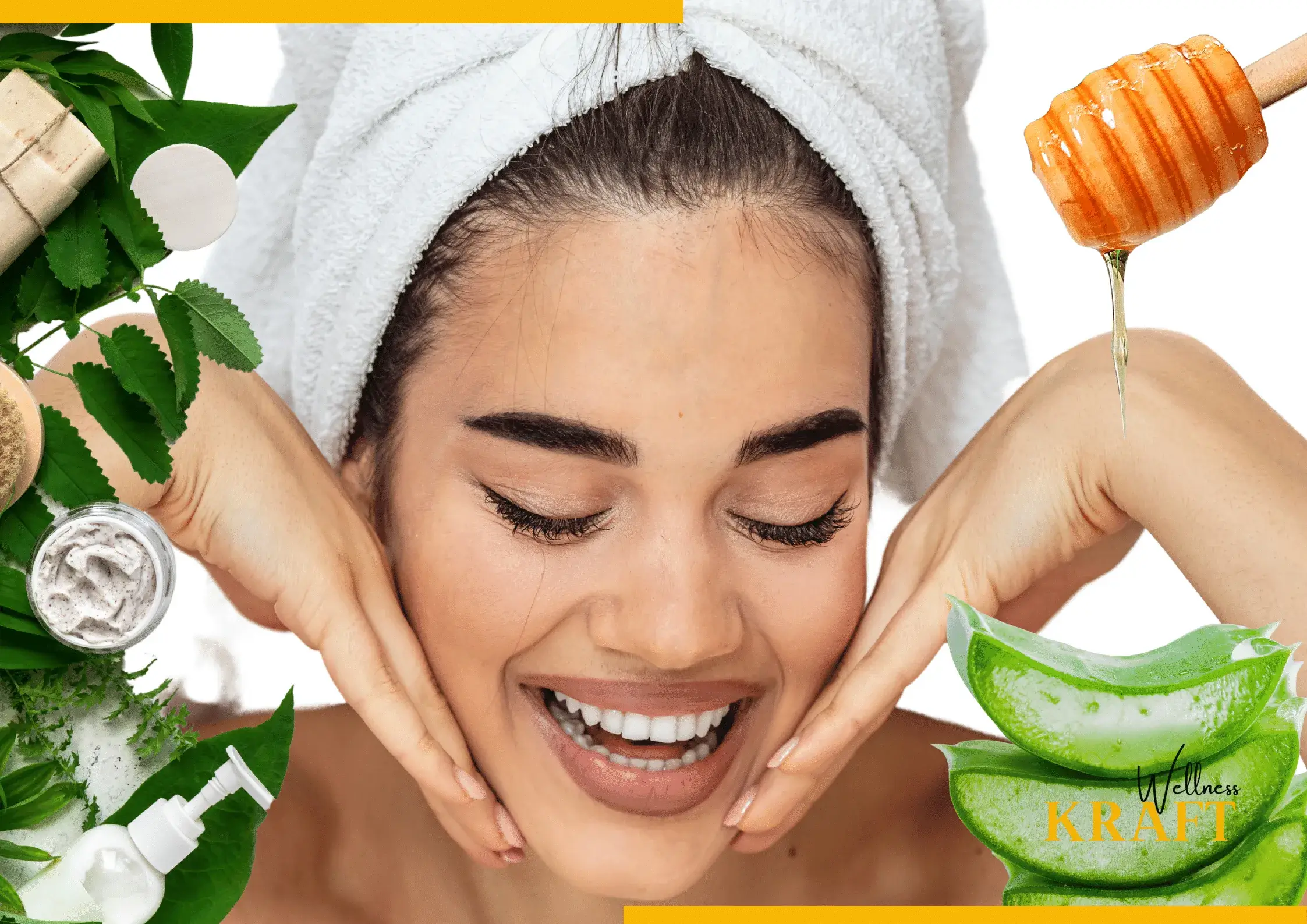“Your skin is a live, breathing organ that serves many functions. Be kind to it, and it will repay you with beauty and vitality.” – Wellness Kraft
Introduction
When it comes to skin care, using the right ingredients is key to achieving healthy, radiant skin. With so many options on the market, it can be overwhelming to choose which skin care ingredients are best for your skin type and concerns.
In this article, we’ll explore 10 trending skin care ingredients that have been making waves in the beauty industry, and explain what they are, how they work, and their potential benefits for your skin. Whether you’re looking to improve hydration, reduce inflammation, or tackle signs of aging, this guide has got you covered. So let’s dive in and discover the power of CBD, hyaluronic acid, vitamin C, bakuchiol, niacinamide, retinol, aloe vera, salicylic acid, and centella asiatica for your skin.
If you’re someone who loves experimenting with different skin care products, you may have noticed the rise of certain trendy ingredients in the past few years. These ingredients are often touted for their ability to address specific skin concerns and provide noticeable results.
Each of these skin care ingredients offers unique benefits for the skin, such as hydration, brightening, anti-aging, and more. However, it’s important to keep in mind that not all ingredients may work for everyone, so it’s always a good idea to do your research and consult with a skin care professional before trying something new.
Are you looking to up your skin care game? One way to do that is by incorporating some of the latest trending skin care ingredients into your routine.
When it comes to taking care of your skin, choosing the right skin care ingredients is essential. With so many new skin care products hitting the market every day, it can be challenging to keep up with the latest and most effective ingredients. That’s why we’ve compiled a list of 10 trending skin care ingredients that you must try.
Whether you’re looking to brighten, hydrate, or fight signs of aging, these ingredients are worth incorporating into your skin care routine.Here are ten trending skin care ingredients that you may want to consider incorporating into your routine:
Table of Contents
CBD

CBD, short for cannabidiol, is a compound found in the cannabis plant that has gained popularity in the skincare industry due to its potential benefits for the skin. Here are some of the pros and cons of using CBD as skin care ingredients in your skin care routine:
Pros:
Anti-inflammatory: CBD has been shown to have anti-inflammatory properties, which can help reduce redness, swelling, and irritation in the skin.
Antioxidant: CBD is also a powerful antioxidant, which means it can help protect the skin from damage caused by free radicals and environmental stressors.
Hydrating: CBD has moisturizing properties that can help hydrate the skin and improve its overall texture.
Acne-fighting: CBD has been shown to help regulate oil production in the skin, making it a potential solution for those with acne-prone skin.
Cons:
Limited research: While there have been some studies on the benefits of CBD for the skin, there is still limited research available to fully understand its potential effects.
Quality control: As with any skin care ingredient, it’s important to ensure that the CBD you’re using is of high quality and sourced from reputable brands.
Potential side effects: While rare, some people may experience side effects from using CBD, such as dry mouth, dizziness, and changes in appetite or mood.
Overall, CBD skin care ingredients can be a beneficial addition to your skin care routine, but it’s important to do your research and speak with a healthcare professional before incorporating it into your regimen.
Chemical Formulation :
The chemical formulation of CBD, or cannabidiol, is C21H30O2. It is a phytocannabinoid that is extracted from the cannabis plant, and it has gained popularity in the skin care industry due to its potential benefits for the skin.
In skin care products, CBD is often combined with other ingredients to create a specific formulation. For example, it may be combined with hyaluronic acid and vitamin C to create a hydrating and brightening serum, or with salicylic acid to create an acne-fighting treatment.
It’s important to note that the concentration and purity of CBD can vary between products, so it’s important to choose a reputable brand and read the label carefully before using any CBD-infused skincare product. Additionally, it’s recommended to consult with a healthcare professional before using any new skincare product, especially if you have any underlying skin conditions or concerns.
Ideal for which skin types:
CBD may be suitable for a variety of skin types, but it’s particularly beneficial for those with sensitive, dry, or acne-prone skin.
For those with sensitive skin, CBD’s anti-inflammatory properties can help reduce redness and irritation, while its moisturizing properties can help soothe and hydrate the skin.
For those with dry skin, CBD’s hydrating properties can help replenish moisture and improve the skin’s overall texture and appearance.
For those with acne-prone skin, CBD’s ability to regulate oil production and reduce inflammation can help prevent breakouts and improve the overall health of the skin.
Everybody’s skin is unique, so what works for one person might not work for another. It’s vital to remember this.It’s recommended to do a patch test before using any new skin care product, including those containing CBD, to ensure that you don’t have any adverse reactions.
Hyaluronic Acid

Hyaluronic acid (HA) is a naturally occurring substance in the body that helps keep the skin hydrated and plump. In skin care products, hyaluronic acid acts as a magical skin care ingredients which is used to help moisturize the skin and reduce the appearance of fine lines and wrinkles.
Pros:
Hydrates the skin: HA has the ability to hold up to 1000 times its weight in water, making it an effective hydrating ingredient in skin care products.
Anti-aging benefits: By helping to keep the skin hydrated, HA can help plump up fine lines and wrinkles, giving the skin a more youthful appearance.
Suitable for most skin types: HA is generally well-tolerated by most skin types, including those with sensitive skin.
Cons:
Can be expensive: High-quality HA formulations can be expensive, making it a less accessible option for some.
May not be effective for everyone: While HA is generally well-tolerated, it may not be effective for everyone, particularly for those with very dry or dehydrated skin.
Chemical formulation:
The chemical formulation of HA is C28H44N2O23. It’s a polysaccharide that can be derived from natural sources, such as rooster combs or bacteria, or can be synthesized in a lab.
Ideal for which skin types:
HA is suitable for most skin types, including those with dry, oily, or sensitive skin. It’s particularly beneficial for those with dehydrated or mature skin, as it can help restore moisture and plumpness to the skin. It’s also a great option for those who are looking to prevent or reduce the appearance of fine lines and wrinkles.
Vitamin C

Vitamin C is a powerful antioxidant that can help brighten and even out the skin tone, protect against environmental stressors, and promote collagen production for a more youthful appearance. Vitamin C is most commonly found but most essential skin care ingredients for our glowing skin.
Pros:
Brightens the skin: Vitamin C can help reduce the appearance of dark spots and promote a brighter, more even skin tone.
Boosts collagen production: By promoting collagen production, vitamin C can help improve the skin’s elasticity and firmness, reducing the appearance of fine lines and wrinkles.
Protects against environmental stressors: Vitamin C can help protect the skin against free radical damage caused by UV rays and other environmental stressors.
Cons:
Can be unstable: Vitamin C is notoriously unstable and can break down when exposed to light, heat, and air. This can make it less effective in skin care products.
May cause irritation: Some people may experience skin irritation or sensitivity when using vitamin C, particularly if they have sensitive skin.
Chemical formulation:
The chemical formulation of vitamin C is C6H8O6. It’s a water-soluble vitamin that can be derived from natural sources, such as citrus fruits or can be synthesized in a lab.
Ideal for which skin types:
Vitamin C is suitable for most skin types, including those with dry, oily, or sensitive skin. It’s particularly beneficial for those with dull or uneven skin tone, as well as those who are looking to reduce the appearance of fine lines and wrinkles. However, those with very sensitive skin may want to use caution when introducing vitamin C into their skin care routine, as it can cause irritation for some people.
Bakuchiol

Bakuchiol is a plant-based alternative to retinol that is known for its ability to promote cell turnover and reduce the appearance of fine lines and wrinkles, without the potential for irritation that can be associated with retinol. This one of it’s kind skin care ingredients is proven to be friendly to mostly all skin types.
Pros:
Gentle on the skin: Unlike retinol, bakuchiol is generally well-tolerated by most skin types, including those with sensitive skin.
Promotes cell turnover: Bakuchiol can help promote cell turnover, leading to smoother, more radiant-looking skin.
Reduces the appearance of fine lines and wrinkles: Bakuchiol has been shown to be effective at reducing the appearance of fine lines and wrinkles, making it a great option for those looking to address signs of aging.
Cons:
Limited research: While there is some research to support the effectiveness of bakuchiol, more studies are needed to fully understand its benefits.
May not be as potent as retinol: While bakuchiol is a great alternative to retinol for those with sensitive skin, it may not be as potent as retinol when it comes to reducing the appearance of fine lines and wrinkles.
Chemical formulation:
The chemical formulation of bakuchiol is C18H24O. It’s a terpenoid that is derived from the seeds and leaves of the Psoralea corylifolia plant.
Ideal for which skin types:
Bakuchiol, skin care ingredients is ideal for most skin types, including those with dry, oily, or sensitive skin. It’s particularly beneficial for those with sensitive skin who may not be able to tolerate retinol. Bakuchiol is also a great option for those looking to reduce the appearance of fine lines and wrinkles, without the potential for irritation that can be associated with retinol.
Niacinamide

Niacinamide, also known as vitamin B3, essential skin care ingredients is a water-soluble vitamin that is known for its ability to improve the appearance of enlarged pores, fine lines, and uneven skin tone.
Pros:
Improves skin texture: Niacinamide has been shown to improve skin texture and reduce the appearance of fine lines and wrinkles.
Minimizes enlarged pores: Niacinamide can help reduce the appearance of enlarged pores, which can lead to smoother-looking skin.
Brightens skin: Niacinamide can help even out skin tone and reduce the appearance of hyperpigmentation, leading to brighter-looking skin.
Cons:
May cause irritation: While niacinamide is generally well-tolerated by most skin types, some individuals may experience mild irritation or redness when using products that contain high concentrations of niacinamide.
Chemical formulation:
The chemical formulation of niacinamide is C6H6N2O. It’s a water-soluble vitamin that is naturally present in many foods, including meat, fish, and green vegetables.
Ideal for which skin types:
Niacinamide is ideal for most skin types, including those with sensitive skin. It’s particularly beneficial for those looking to improve the appearance of enlarged pores, fine lines, and uneven skin tone. Niacinamide, skin care ingredients can also be helpful for individuals with acne-prone skin, as it can help regulate sebum production and minimize the appearance of blemishes.
Retinol

Retinol, a form of vitamin A, is a popular ingredient in many anti-aging skincare products due to its ability to increase cell turnover and stimulate collagen production.
Pros:
Reduces fine lines and wrinkles: Retinol can help reduce the appearance of fine lines and wrinkles, making it a popular anti-aging ingredient.
Improves skin texture: Retinol can also help improve skin texture, leading to smoother, more radiant-looking skin.
Minimizes the appearance of pores: Retinol can help reduce the appearance of enlarged pores, leading to a more even complexion.
Cons:
May cause irritation: Retinol can be irritating to some individuals, particularly those with sensitive skin, leading to redness, flakiness, and dryness.
Increased sun sensitivity: Retinol can increase skin sensitivity to the sun, making it important to use sunscreen and avoid prolonged sun exposure when using retinol products.
Not recommended during pregnancy: Retinol is not recommended for use during pregnancy due to its potential to cause birth defects.
Chemical formulation:
The chemical formulation of retinol is C20H30O. It’s a fat-soluble vitamin that is naturally present in many foods, including liver, fish, and dairy products.
Ideal for which skin types:
Retinol is ideal for those looking to reduce the appearance of fine lines and wrinkles and improve skin texture. It can be particularly beneficial for individuals with mature or sun-damaged skin. However, individuals with sensitive skin may want to use retinol products with caution or avoid them altogether, as they can cause irritation. It’s also important to note that retinol should not be used during pregnancy.
Aloevera

Aloe vera is a substance derived from plants that has been utilized for its therapeutic benefits for ages. It’s a popular ingredient in many skin care products due to its hydrating, soothing, and anti-inflammatory properties.
Pros:
Hydrating: Aloe vera is a natural humectant, which means it can help attract and retain moisture in the skin, making it an excellent ingredient for dry or dehydrated skin.
Soothing: Aloe vera has anti-inflammatory properties, which can help soothe and calm irritated or inflamed skin.
Anti-Aging: Salicylic acid’s ability to promote cell turnover and stimulate collagen formation makes it an effective anti-aging agent.
Cons:
Allergic reactions: While aloe vera is generally considered safe for most individuals, some people may be allergic to it, leading to skin irritation or allergic reactions.
Not a standalone ingredient: While aloe vera can provide hydration and soothing benefits, it’s not typically used as a standalone ingredient in skincare products. It’s often combined with other ingredients to provide additional benefits.
Chemical formulation:
The chemical formulation of aloe vera is complex and contains a variety of compounds, including polysaccharides, anthraquinones, and enzymes. The primary active compound in aloe vera is acemannan, a type of polysaccharide that has been shown to have anti-inflammatory and immune-stimulating properties.
Ideal for which skin types:
Aloe vera is ideal for individuals with dry or dehydrated skin, as it can provide a boost of hydration. It’s also beneficial for those with sensitive or irritated skin, as its anti-inflammatory properties can help calm and soothe the skin. Aloe vera can be used by all skin types, but individuals with oily or acne-prone skin may want to look for products that contain a lower concentration of aloe vera or use it in conjunction with other ingredients that can help regulate oil production.
Salicylic Acid

Salicylic acid is a beta-hydroxy acid (BHA) that is commonly used in skincare products for its exfoliating and acne-fighting properties.
Pros:
Exfoliating: Salicylic acid is a chemical exfoliant that can help remove dead skin cells and unclog pores, making it an effective ingredient for treating acne and improving skin texture.
Anti-inflammatory: Salicylic acid has anti-inflammatory properties, which can help reduce redness and irritation associated with acne and other inflammatory skin conditions.
Anti-aging: Salicylic acid can help improve the appearance of fine lines and wrinkles by promoting cell turnover and stimulating collagen production.
Cons:
Irritation: Salicylic acid can be irritating to some individuals, especially those with sensitive skin. It’s important to start with a low concentration and gradually increase over time to avoid irritation.
Photosensitivity: Salicylic acid can make the skin more sensitive to the sun, so it’s important to use sunscreen when using products containing salicylic acid.
Chemical formulation:
Salicylic acid is a derivative of salicin, which is derived from willow bark. It’s a lipophilic (oil-soluble) acid that is able to penetrate deep into the pores to dissolve sebum and other impurities.
Ideal for which skin types:
Salicylic acid is ideal for individuals with oily, acne-prone skin, as it can help unclog pores and reduce the appearance of blemishes. It can also be used by individuals with combination skin, as it can help regulate oil production in the T-zone. Those with dry or sensitive skin may want to avoid using salicylic acid or use it sparingly, as it can be drying and potentially irritating. It’s also important to note that salicylic acid should not be used by individuals who are allergic to aspirin.
Centella Asiatica

Centella Asiatica, also known as Gotu Kola or Tiger Grass, is a plant-based ingredient that has been used for centuries in traditional medicine for its healing and anti-inflammatory properties.
Pros:
Anti-inflammatory: Centella Asiatica contains compounds that have been shown to reduce inflammation, making it an effective ingredient for treating acne, eczema, and other inflammatory skin conditions.
Wound healing: Centella Asiatica can help promote wound healing by increasing collagen production and improving circulation to the affected area.
Antioxidant: Centella Asiatica contains antioxidants that can help protect the skin from free radical damage and reduce the appearance of fine lines and wrinkles.
Cons:
Sensitivity: While Centella Asiatica is generally well-tolerated by most skin types, some individuals may experience sensitivity or allergic reactions to the plant.
Chemical formulation:
Centella Asiatica contains several active compounds, including triterpenoids, flavonoids, and asiaticoside, which have been shown to have anti-inflammatory and antioxidant properties.
Ideal for which skin types:
Centella Asiatica is ideal for individuals with sensitive, acne-prone, or aging skin. Its anti-inflammatory and antioxidant properties make it an effective ingredient for reducing inflammation, promoting healing, and protecting the skin from free radical damage. It can also be used by individuals with dry or combination skin, as it can help soothe and hydrate the skin.
Research data:
PubMed: This is a free database of biomedical research articles provided by the US National Library of Medicine. You can search for specific skin care ingredients and find related research studies.
ScienceDirect: This is a subscription-based database of scientific, technical, and medical research articles. It contains a vast collection of articles related to skin care ingredients, their efficacy, and safety.
Google Scholar: This is a free search engine that allows you to search for scholarly literature, including articles, theses, books, and conference papers. You can use it to find research studies related to specific skin care ingredients.
Cosmetic Ingredient Review (CIR): This is an independent scientific body that reviews the safety of cosmetic ingredients. You can visit their website to find safety assessments of various skin care ingredients.
By referring to these sources, you can find reliable research data related to the trending skin care ingredients mentioned in the article.
Concluding Thoughts
In conclusion, skin care ingredients such as CBD, hyaluronic acid, vitamin C, bakuchiol, niacinamide, retinol, aloe vera, salicylic acid, and centella asiatica are all trending in the skin care industry for their various benefits and unique properties. However, it is important to note that each skin care ingredient has its own set of pros and cons, and not all ingredients may be suitable for every skin type.
When incorporating these ingredients into your skin care routine, it is crucial to understand their chemical formulations and ideal skin types to ensure optimal results. It is also recommended to patch test any new product before applying it to the entire face.
Keep in mind that not all skin care ingredients work for everyone, so it’s important to patch test and gradually introduce them into your skin care routine. Additionally, it’s always a good idea to consult with a skin care professional if you have any questions or concerns about trying new skin care ingredients.
These 10 trending skin care ingredients offer a wide range of benefits, from hydration to brightening and anti-aging properties. Whether you’re looking to revamp your skin care routine or simply want to try something new, these skin care ingredients are worth considering.However, it’s essential to remember that skin care is a journey, and it may take time to see the results you desire.
As stated in an article by Wellness Kraft, it is important to prioritize the quality and effectiveness of skincare ingredients over trendy marketing claims. By staying informed and knowledgeable about the ingredients in your skin care products, you can make informed decisions and achieve healthy, glowing skin.
Key Takeaways
1.CBD, hyaluronic acid, vitamin C, bakuchiol, niacinamide, retinol, aloe vera, salicylic acid, and centella asiatica are trending skin care ingredients with various benefits.
2.Each ingredient has its own set of pros and cons, and not all ingredients may be suitable for every skin type.
3.It is important to understand the chemical formulations and ideal skin types of each ingredient before incorporating them into your skin care routine.
4.Patch testing any new product before applying it to the entire face is recommended.
5.Prioritizing the quality and effectiveness of skin care ingredients over trendy marketing claims is crucial.
6.Staying informed and knowledgeable about the skin care ingredients in your skin care products can help you make informed decisions and achieve healthy, glowing skin.
FAQs
1.What is CBD, and how does it benefit the skin?
CBD is a non-psychoactive compound derived from the hemp plant that has anti-inflammatory and antioxidant properties. It can help soothe irritated skin, reduce inflammation, and promote a more balanced complexion.
2.Is CBD safe for all skin types?
CBD is generally safe for all skin types, but it’s always a good idea to patch test any new product before applying it to the entire face.
3.What is hyaluronic acid, and how does it benefit the skin?
Hyaluronic acid is a naturally occurring substance in the body that helps retain moisture in the skin. It can help plump up the skin, reduce the appearance of fine lines and wrinkles, and improve skin elasticity.
4.Is hyaluronic acid suitable for all types of skin?
Hyaluronic acid is safe for all skin types and is particularly beneficial for those with dry or dehydrated skin.
5.What is vitamin C, and how does it benefit the skin?
Vitamin C is an antioxidant that can help brighten the skin, even out skin tone, and reduce the appearance of fine lines and wrinkles.
6.Is vitamin C safe for all skin types?
Vitamin C is generally safe for all skin types, but those with sensitive skin may need to use a lower concentration or patch test first.
7.What is bakuchiol, and how does it benefit the skin?
Bakuchiol is a plant-based alternative to retinol that can help reduce the appearance of fine lines and wrinkles, improve skin texture, and promote a more even skin tone.
8.Is bakuchiol safe for all skin types?
Bakuchiol is generally safe for all skin types, including sensitive skin.
9.What is niacinamide, and how does it benefit the skin?
Niacinamide is a form of vitamin B3 that can help reduce inflammation, regulate oil production, and improve skin texture.
10.Is niacinamide safe for all skin types?
Niacinamide is safe for all skin types, including sensitive skin, and can be used in combination with other skin care ingredients.









1 comment